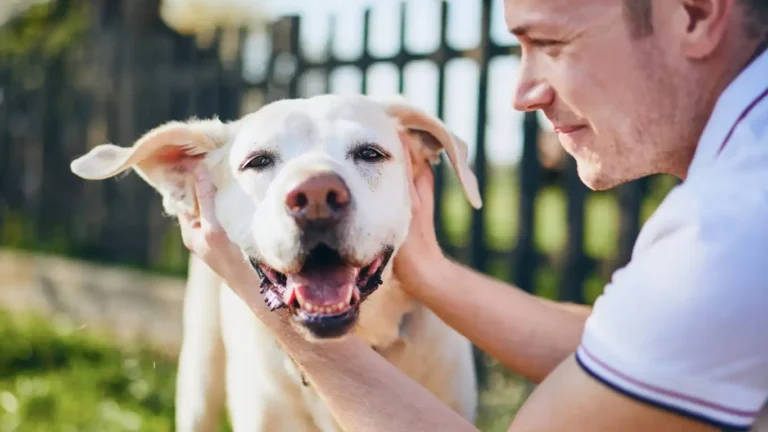Best Ways to Prevent Dog Food Allergies & Keep Your Dog Healthy
As a veterinary technician specializing in nutrition, I’ve seen firsthand how challenging food allergies can be for dogs. It’s heartbreaking to watch your furry friend suffer from symptoms like itchy skin, upset stomachs, or ear infections, all caused by something as simple as their food. The good news? You can take steps to prevent dog food allergies from taking hold in the first place. But, first, it’s important to understand what food allergies are and why they happen. In this article, we’ll dive into the best ways to prevent dog food allergies, from choosing the right diet to understanding your dog’s nutritional needs. By the end, you’ll have the tools you need to make informed decisions that keep your dog healthy, happy, and allergy-free.
What Causes Dog Food Allergies?

Before we jump into prevention methods, let’s take a moment to understand what causes food allergies in dogs. Just like humans, dogs can develop sensitivities or allergic reactions to certain proteins, grains, or additives found in their food. A food allergy happens when your dog’s immune system mistakenly identifies a harmless ingredient as a threat, triggering an allergic response. Common culprits include proteins like beef, chicken, lamb, and dairy, as well as grains such as wheat, corn, and soy.
Interestingly, food allergies are relatively rare in dogs. According to veterinary research, only about 10% of all dog allergies are food-related. Most dogs with allergies suffer from environmental triggers like pollen or dust mites. However, when food allergies do occur, they can be frustrating and difficult to manage. Symptoms can range from mild to severe, and they often take some time to identify and diagnose properly.
Best Ways to Prevent Dog Food Allergies
Now that we know what causes food allergies in dogs, let’s talk about how you can prevent them. It all starts with the food you choose and how you introduce it to your dog’s diet. Here are some simple yet effective ways to reduce the risk of food allergies:
1. Choose High-Quality Dog Food Ingredients

One of the best ways to prevent dog food allergies is to feed your dog high-quality food made with premium ingredients. It might be tempting to grab the cheapest bag on the shelf, but remember that not all dog food is created equal. High-quality food typically uses real meat as the first ingredient, rather than meat by-products or fillers like corn and soy, which can be hard on a dog’s digestive system.
Look for foods that list a specific source of protein (like chicken, turkey, or salmon) as the first ingredient. Avoid foods that contain a lot of artificial preservatives, colors, or flavors, as these can trigger allergies or sensitivities. A simple, clean ingredient list can do wonders for your dog’s health.
2. Gradually Transition to New Foods
When introducing a new food to your dog’s diet, it’s essential to do so gradually. Abrupt changes in diet can upset your dog’s stomach and cause digestive issues, which may be mistaken for food allergies. Start by mixing a small amount of the new food with your dog’s current food, slowly increasing the proportion over the course of 7–10 days.
This gradual transition allows your dog’s digestive system to adjust without overwhelming it. If your dog has a sensitivity to any ingredients, you’ll be more likely to notice it during this transition period, giving you a heads-up before things get worse.
3. Opt for Limited Ingredient Diets (LID)

If your dog has shown signs of allergies in the past, you might want to consider feeding them a limited ingredient diet (LID). These diets contain fewer ingredients, usually focusing on a single protein source and a single carbohydrate. This makes it easier to identify which ingredient might be causing the problem if your dog has an allergic reaction.
LID foods are often recommended for dogs with food sensitivities or those prone to developing allergies. Plus, the fewer ingredients your dog is exposed to, the less likely they are to develop sensitivities over time. Keep an eye out for LID formulas that use high-quality protein sources like venison, duck, or fish, as these are less likely to cause allergic reactions compared to more common proteins like beef or chicken.
4. Avoid Common Allergens in Dog Food
Some ingredients are more likely to trigger allergies in dogs than others. Beef, chicken, dairy, eggs, soy, corn, and wheat are some of the most common allergens in dog food. If your dog is prone to allergies, consider avoiding foods that contain these ingredients, especially if they are listed near the top of the ingredient list.
If you’re unsure about what ingredients to avoid, consult with your veterinarian. They can help you create a custom diet plan tailored to your dog’s specific needs and sensitivities. In some cases, your vet may recommend hypoallergenic food that’s been specially formulated to minimize allergic reactions.
5. Consider Raw or Homemade Diets
Some pet owners find that a raw or homemade diet can help prevent food allergies, particularly if their dog has had trouble with commercial dog food in the past. By preparing food at home, you can control exactly what goes into your dog’s meals, ensuring that you’re using fresh, whole ingredients free from unnecessary additives or fillers.
However, it’s important to do your research and consult with your vet before switching to a raw or homemade diet. These diets can be complex and require careful planning to ensure your dog gets all the necessary nutrients. If done correctly, a raw or homemade diet can provide your dog with high-quality, natural food that’s easy to digest and unlikely to trigger an allergic reaction.
Monitor and Address Symptoms Early

Even with the best preventive measures, it’s important to stay vigilant for any signs that your dog might be developing a food allergy. The earlier you catch the symptoms, the easier it is to manage the problem before it gets out of hand. Some of the most common symptoms of food allergies in dogs include:
- Itchy skin or ears – If your dog is constantly scratching or licking at their skin, ears, or paws, this could be a sign of an allergy.
- Gastrointestinal issues – Vomiting, diarrhea, and gas can be symptoms of food intolerance or allergies.
- Ear infections – Dogs with allergies are prone to frequent ear infections, often caused by the inflammation that comes with allergic reactions.
- Hair loss – Chronic itching can lead to hair loss, particularly around the ears, paws, and tail.
If you notice any of these symptoms, don’t panic, but do take action. Early intervention is key to making sure your dog doesn’t suffer from prolonged discomfort. Start by eliminating potential allergens from their diet and keep a close eye on their condition. In some cases, the symptoms may resolve on their own once the allergen is removed from their food. However, it’s always best to consult with your vet to get an accurate diagnosis and determine the best course of action.
Work with Your Veterinarian

When in doubt, always reach out to your veterinarian. As a veterinary technician myself, I can’t emphasize enough how valuable it is to have an expert on your side when it comes to managing your dog’s diet and health. Vets can run tests to help identify food allergies or sensitivities, and they’ll work with you to develop a nutrition plan that suits your dog’s unique needs. It’s also important to mention that while some symptoms may look similar to allergies, they can also be caused by other health issues, such as parasites or infections. Your vet will be able to rule those out and provide a more accurate diagnosis.
If you suspect your dog is allergic to a specific ingredient, your vet might recommend an elimination diet. This involves feeding your dog a limited set of ingredients for several weeks, slowly reintroducing potential allergens one by one. It can take some time, but it’s an effective method for pinpointing exactly what’s causing the allergic reaction. The process can be frustrating, but trust me—once you find the culprit, it’s a game-changer for both you and your dog.
Consider Food Trials and Hypoallergenic Diets
If your dog has been diagnosed with a food allergy, your vet may recommend a hypoallergenic diet, which is designed to minimize allergic reactions. Hypoallergenic dog foods typically use novel proteins and carbohydrates that your dog has never been exposed to before, such as venison, duck, or sweet potatoes. These ingredients are less likely to trigger an allergic response compared to common proteins like beef, chicken, or lamb.
How Hypoallergenic Diets Work
The goal of a hypoallergenic diet is to reduce the risk of your dog’s immune system reacting to certain ingredients. These diets usually avoid the most common allergens and focus on simple, easily digestible proteins and carbs. By eliminating the usual suspects, hypoallergenic diets provide relief for dogs with food sensitivities and allow their digestive system to function normally without the irritation caused by allergens.
For instance, in my experience, I’ve seen a noticeable improvement in dogs who switch to hypoallergenic foods. One of my clients had a dog with chronic ear infections and skin problems. After a food trial using a novel protein diet (in this case, duck), the dog’s symptoms cleared up within a few weeks. It was an incredible transformation—and one of the reasons I’m such a strong advocate for working with a vet to find the right solution for your pet.
Look for Probiotics and Digestive Health Support

A key component of preventing food allergies is maintaining your dog’s gut health. A healthy gut means your dog is better equipped to handle new foods and more resilient to potential allergens. Probiotics, which are beneficial bacteria that support digestion, can be a game-changer when it comes to food allergies. They help balance the gut microbiome, improve digestion, and enhance nutrient absorption.
Many high-quality dog foods now include probiotics in their formulas. But if you’re feeding your dog a homemade diet or raw food, you might want to consider supplementing with probiotics. These can be found in various forms, from powders and capsules to treats and chewables. As always, consult with your vet to determine the right type and dosage for your dog’s needs.
Another benefit of supporting your dog’s digestive health is that it can help reduce the risk of developing sensitivities in the first place. A strong, healthy digestive system can better process new foods and prevent an overactive immune response, which is often the underlying cause of food allergies.
Keep Your Dog’s Weight in Check
Maintaining your dog’s weight is another often-overlooked factor in preventing food allergies. Obesity and being overweight can put added stress on your dog’s immune system, which can make them more susceptible to allergies and other health issues. Keeping your dog at a healthy weight not only supports their overall health but can also reduce the chances of developing food sensitivities.
To keep your dog’s weight under control, make sure you’re feeding them the right portion sizes, and don’t forget to factor in their activity level. Dogs that get regular exercise are less likely to become overweight, and they’re also generally healthier overall, making them less prone to developing allergies.
If you’re unsure whether your dog is at a healthy weight, your vet can help you assess their body condition score and recommend a suitable diet and exercise plan. Regular weight checks are especially important as your dog ages or if they’re transitioning to a new diet.
Be Aware of Food Additives and Artificial Ingredients

One of the sneaky causes of food allergies in dogs that often gets overlooked is food additives and artificial ingredients. Many dog foods, particularly the cheaper brands, use artificial preservatives, colors, and flavorings to enhance the appeal of the product. These ingredients can irritate your dog’s digestive system and contribute to the development of allergies over time.
As a veterinary technician, I’ve seen dogs struggle with food allergies that were triggered not by the main protein or grain but by these very additives. For example, a client once came to me with a dog that was constantly scratching, had dull fur, and was lethargic. After switching to a natural, preservative-free food, the dog’s symptoms improved dramatically within a few weeks. It was a reminder to me of how important it is to avoid those artificial fillers.
When choosing food for your dog, always read the ingredient list carefully. Some of the most common food additives that may cause allergic reactions in dogs include:
- BHA/BHT – Artificial preservatives that are often used to prolong shelf life.
- Ethoxyquin – A chemical preservative often used in pet foods.
- Artificial colors and flavors – These are used to make the food look and taste more appealing but offer no nutritional value and can cause sensitivities in some dogs.
- Propylene glycol – A chemical used as a moisture-retaining agent that can be harmful in large amounts.
Whenever possible, choose dog food with natural preservatives like vitamin E (tocopherols) and vitamin C, which are much gentler on your dog’s system and much less likely to cause adverse reactions.
Consider Supplements for Allergy Relief
If your dog is already prone to food allergies or sensitivities, consider adding supplements to their diet to help support their immune system and reduce inflammation. Some of the most commonly recommended supplements for dogs with allergies include:
1. Omega-3 Fatty Acids
Omega-3 fatty acids are well known for their anti-inflammatory properties. Adding fish oil to your dog’s diet can help reduce skin inflammation, itching, and other allergy-related symptoms. I’ve personally seen dogs with chronic skin issues benefit from omega-3s—especially when combined with a high-quality diet free from common allergens. It works wonders for improving coat quality and skin health, giving your dog that shiny, healthy fur you love to pet.
2. Quercetin
Quercetin is a flavonoid found in certain fruits and vegetables, and it’s known for its natural antihistamine and anti-inflammatory properties. It can help alleviate symptoms like itching, sneezing, and rashes, often associated with food allergies in dogs. If you’re looking to provide extra relief for your dog, a quercetin supplement might be worth considering. Just make sure to consult with your vet to determine the appropriate dosage.
3. Probiotics
As mentioned earlier, probiotics are beneficial for gut health, and they can play a role in preventing or reducing food allergies. They help balance the bacteria in your dog’s digestive system, making it easier for your dog to process and absorb nutrients from their food. Probiotics are particularly useful in keeping the immune system strong and managing inflammation. I recommend probiotics for any dog with a sensitive stomach or those prone to allergies.
Alternative Diets for Dogs with Severe Food Sensitivities
For dogs with severe food sensitivities or diagnosed food allergies, sometimes the most effective approach is switching to a completely alternative diet. If traditional dog foods aren’t working, or if your dog has a long list of allergens, you may want to consider these options:
1. Raw Food Diet
A raw food diet, often referred to as a “BARF” (Biologically Appropriate Raw Food) diet, is a popular alternative for dogs with food sensitivities. The idea behind this diet is to feed your dog fresh, whole ingredients that mimic what their ancestors would have eaten in the wild. Typically, this includes raw meat, bones, vegetables, and fruits.
While a raw food diet can be beneficial for some dogs, it requires careful planning to ensure nutritional balance. It’s not something you should jump into without consulting a veterinarian or a pet nutritionist who is knowledgeable about raw feeding. Done correctly, it can help minimize allergens and provide a nutrient-dense meal. Just be sure to source high-quality ingredients and practice proper food safety measures to avoid any risks associated with raw feeding.
2. Home-Cooked Meals
If you prefer more control over what your dog eats, preparing home-cooked meals could be a great option. This allows you to choose fresh, allergy-friendly ingredients and avoid any potential allergens in commercial dog food. When cooking for your dog, it’s important to focus on lean meats, vegetables, and carbohydrates that are gentle on their digestive system.
Again, I can’t stress enough how important it is to ensure that your dog’s homemade meals are nutritionally balanced. It’s easy to overlook key nutrients, so working with a vet or nutritionist is essential to ensure you’re providing a well-rounded diet. I’ve seen many dog owners create fantastic meals at home, and their pets thrive with the right recipes and supplements.
References
For more information on dog food allergies and nutrition, check out these trusted resources:
Disclaimer
While this article provides general information on preventing dog food allergies, it is not a substitute for professional veterinary advice. Always consult with your veterinarian for specific recommendations regarding your dog’s health, diet, and treatment options. The suggestions provided here are based on general knowledge and experience in veterinary care, but each dog is unique, and what works for one may not work for another.






